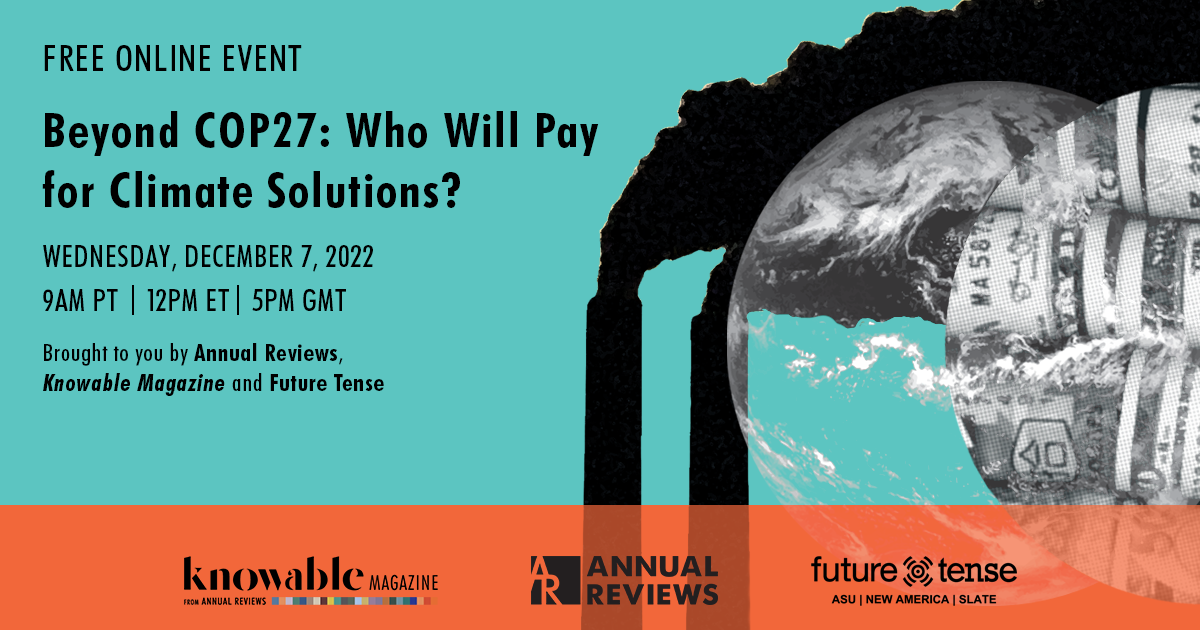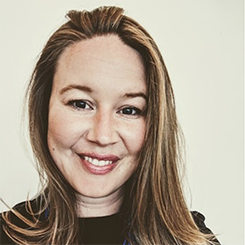
Dec
7
5:00pm
Beyond COP27: Who Will Pay for Climate Solutions?
By Knowable Magazine
Trillions of dollars every year, for decades. That’s what we need to spend on green technology and infrastructure to stave off the worst impacts of climate change, experts calculate. As negotiations continue beyond this year’s UN climate summit (COP27), join our free online conversation with Tobias Adrian, of the International Monetary Fund, and Shuang Liu, of the World Resources Institute, about how governments, banks and investors can fund a greener future – and why that’s a smart investment.
Attendees will learn:
-The role of national governments, international organizations, and private industry in addressing climate change
-Why many argue that wealthy countries such as the US should do more to help poor countries adapt to climate change
-Why large investments in science and technology are needed to meet emissions targets
Speakers:
Tobias Adrian
Financial Counselor and Director of the Monetary and Capital Markets Department, International Monetary Fund (IMF)
-1668546973756.png)
Tobias Adrian leads IMF efforts to find strengths and weaknesses in the global financial system, and to ensure its stability. Before joining the IMF, Tobias was a senior vice president of the Federal Reserve Bank of New York, where he contributed to monetary policy, financial stability policies and crisis management. He has published extensively in economics and finance journals and is on the Editorial Committee of the Annual Reviews of Financial Economics. He holds a PhD from the Massachusetts Institute of Technology.
Shuang Liu
China Finance Director, World Resources Institute (WRI)

Shuang Liu leads the WRI Sustainable Finance Center's work on China finance and the Belt and Road Initiative. She works with governments, private financial institutions, NGOs and other partners to shift China's investment to sustainable finance. Prior to WRI, Liu oversaw the development and implementation of strategies on climate mitigation and economic transition at Energy Foundation China. She developed Greenpeace’s first coal campaign strategy in China and has worked for consulting firms to assess greenhouse gas mitigation opportunities for private sector clients and government agencies. Liu holds a master’s degree in environmental and resource economics from University College London.
Moderator:
Emily Underwood, Knowable Magazine

Emily Underwood is the host and producer of virtual events at Knowable Magazine from Annual Reviews. She has been covering science for over a decade, including as a staff neuroscience reporter for Science. In 2016-17, she was a Rosalynn Carter Fellow for Mental Health Journalism, and her reporting has won national awards, including a 2018 National Academies Keck Futures Initiatives Communication Award for magazine writing.
This event is part of an ongoing series of live events and science journalism from Knowable Magazine and Annual Reviews, a nonprofit publisher dedicated to synthesizing and integrating knowledge for the progress of science and the benefit of society.
Future Tense is a partnership of Slate, New America and Arizona State University that examines emerging technologies, public policy, and society. Sign up for Future Tense’s newsletter: https://slate.com/sign-up-for-the-future-tense-newsletter
hosted by
Knowable Magazine
share